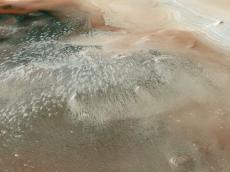|
|
TODAY.AZ / World news
Musk sends robots with artificial intelligence to Mars
18 February 2025 [23:50] - TODAY.AZ

By Alimat Aliyeva
The founder of the American company SpaceX, Elon Musk, plans to send robots with artificial intelligence to Mars in November 2026. He made the announcement on the social network X, Azernews reports.
According to Musk, a trip between Earth and Mars is possible approximately once every 26 months. The next opportunity for such a mission will occur around November 2026.
"If everything goes well, SpaceX will send Starship rockets to Mars, along with autonomous robots and artificial intelligence Grok," he said.
On February 18, Musk introduced a new, more advanced version of the chatbot from his company xAI, called Grok-3. In tests, Grok-3 outperformed GPT-4, Claude 3.5, Sonnet, Gemini-2 Pro, and DeepSeek-V3 in areas such as mathematics, programming, and scientific computing.
Earlier this month, it was reported that Musk supported sending an expedition to Mars to investigate a "square structure" observed in NASA images. Some consider this structure to be a natural formation, while conspiracy theorists believe it may be evidence of an alien civilization.
Musk's plans for Mars reflect his long-term vision of making humanity a multi-planetary species, with the goal of establishing a permanent human presence on Mars. The mission will not only involve transporting humans but also creating the necessary infrastructure to support life and research on the Red Planet.
The deployment of autonomous robots with AI on Mars is particularly intriguing, as it reflects the cutting-edge role of artificial intelligence in space exploration. Robots equipped with AI could help perform complex tasks such as scientific research, resource exploration, and maintenance of Mars habitats, paving the way for future human missions.
As for the "square structure" spotted in NASA's imagery, whether it is a product of natural geological processes or something more extraordinary, it adds to the growing intrigue surrounding Mars and the possibility of discovering new insights about the planet’s history. As space exploration advances, such anomalies continue to fuel both scientific curiosity and speculation.
URL: http://www.today.az/news/regions/257098.html
 Print version
Print version
Connect with us. Get latest news and updates.
See Also
- 14 February 2026 [12:40]
Passenger plane slides off runway at Kazan airport - 14 February 2026 [11:36]
Russian attacks in southern Ukraine kill 2, injure 7 - 14 February 2026 [10:31]
US Navy surveillance aircraft conduct extended missions near Iranian coast - 14 February 2026 [09:00]
China tightens automaker pricing rules - 14 February 2026 [08:00]
Meta’s AI manage profiles after death - 13 February 2026 [23:50]
The myth of the soulmate: Why love isn’t just “destiny” - 13 February 2026 [22:35]
Hyundai Palisade and Kia EV9 win Canadian Car of the Year - 13 February 2026 [21:19]
Europe’s largest rocket launches 32 Amazon satellites - 13 February 2026 [20:50]
Trump reverses Obama-era climate ruling, sparking controversy over vehicle emissions - 13 February 2026 [19:50]
US to cut steel and aluminum tariffs
Most Popular
 United States takes over nuclear security of South Caucasus
United States takes over nuclear security of South Caucasus
 Baku and Washington have passed a verdict on the 907th Amendment
Baku and Washington have passed a verdict on the 907th Amendment
 German expert: Vance's trip to South Caucasus means more than just working trip
German expert: Vance's trip to South Caucasus means more than just working trip
 Israel's Herzog hopes US talks can topple Iran's 'evil empire'
Israel's Herzog hopes US talks can topple Iran's 'evil empire'
 UAE’s Mohamed Ali Al Shorafa meets Baku officials, strengthens Azerbaijan-UAE ties
UAE’s Mohamed Ali Al Shorafa meets Baku officials, strengthens Azerbaijan-UAE ties
 Georgia to restrict older car imports
Georgia to restrict older car imports
 Zatulin’s speech exposes Kremlin’s anxiety over post-Karabakh order [OPINION]
Zatulin’s speech exposes Kremlin’s anxiety over post-Karabakh order [OPINION]
